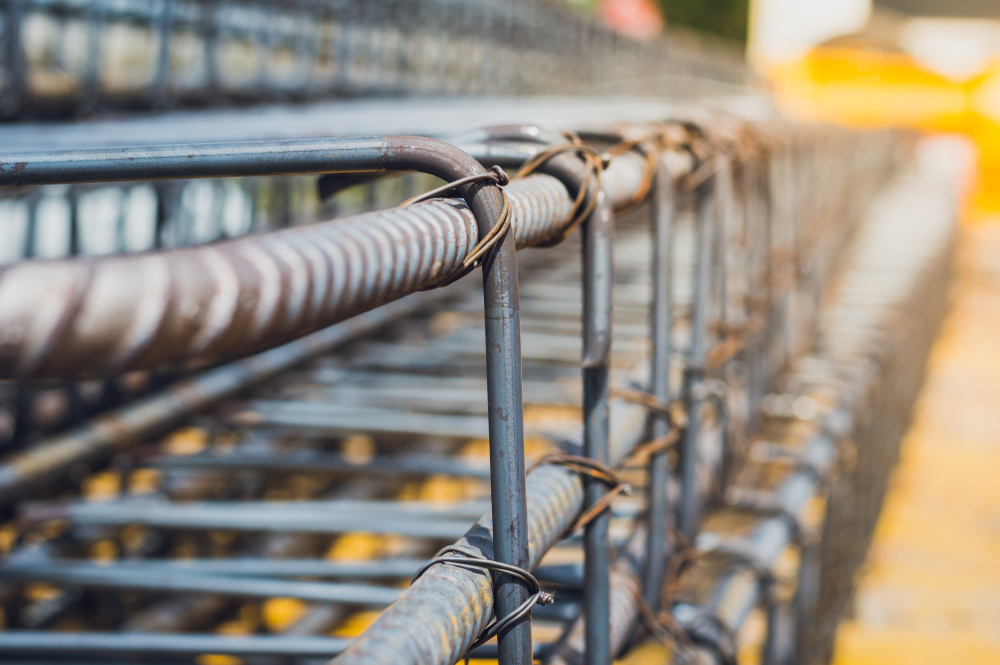TMT bars or Thermo-Mechanically Treated bars are high-strength reinforcement bars having a tough outer core and a soft inner core. The first step of the manufacturing process involves formation of billet through Continuous Casting Machine (CCM). CCM is a process of casting metal into billet which can be further shaped into suitable products. At TMT Saria we believe in being a class apart, we have a well-equipped integrated plant that produces billets, in – house and thereafter the process of making TMT begins. The TMT is passed through quinching and tempered process. While passing the TMT through the quinching and tempered process, the water pressure is optimised. The sudden quenching and drastic change in temperature toughens the outer layer of the TMT bar, thus making it super tough and durable.

Once this process is over, the TMT bars are subject to atmospheric cooling. This is done in order to equalise the temperature difference between the soft inner core and the tough exterior. Once the TMT bar cools down, it slowly turns into a ferrite-pearlite mass. The inner core remains soft giving the TMT bar great tensile strength, shock absorbing resistance and elongation point. This design is unique to the TMT bars and gives superior ductility to the bars. Also, this unique manufacturing technology of V Rib and the absence of Cold stress makes this bar corrosion-resistant and also boosts its weldability.
TMT Saria Has Better Weight Tolerance
| Size | Specified (kg/meter) | Specified (kg/meter) | Per Wt.Variation (kg/meter) | Individual sample variation | |||
|---|---|---|---|---|---|---|---|
| ISI Std. | TMT Saria Std. | ISI Std. | TMT Saria Std. | ISI Std. | TMT Saria Std. | ||
| 08mm | 0.395 | 367 to 423 | 379 to 411 | 0.056 | 0.032 | ±7 | ±5 |
| 10mm | 0.617 | 574 to 660 | 598 to 636 | 0.086 | 0.038 | ±7 | ±4 |
| 12mm | 0.888 | 844 to 932 | 870 to 906 | 0.088 | 0.036 | ±5 | ±3 |
| 16mm | 1.580 | 1501 to 1659 | 1548 to 1612 | 0.158 | 0.064 | ±5 | ±3 |
| 20mm | 2.470 | 2396 to 2544 | 2445 to 2495 | 0.148 | 0.050 | ±3 | ±2 |
| 25mm | 3.850 | 3735 to 3965 | 3811 to 3889 | 0.230 | 0.078 | ±3 | ±2 |
| 28mm | 4.830 | 4685 to 4975 | 4782 to 4878 | 0.290 | 0.096 | ±3 | ±2 |
| 32mm | 6.314 | 6125 to 6503 | 6207 to 6884 | 0.290 | 0.096 | ±3 | ±2 |
TMT Saria Is Better Then The Prescribed Standards -
The Indian Standard Bureau and International Standards Bureau prescribe certain maximum chemical composition of Carbon. Sulphur and Phosphorus. Our products even further better these. standards. Similarly, even for mechanical properties our products surpass the prescribed standards . We do this to .satisfy the needs of our esteemed customers for a good quality product and to give them maximum value for their money. The following tables would make the picture more clear:-
Chemical Composition Table -
| Chemistry | Unit | IS 1786 Fe 415 | TMT Saria Fe 415 | TMT Saria Fe 500 | TMT Saria Fe 550 |
|---|---|---|---|---|---|
| Carbon | % | 0.30 | 0.25 | 0.20 | 0.20 |
| Sulphur | % | 0.06 | 0.05 | 0.05 | 0.05 |
| Phosphorus | % | 0.06 | 0.05 | 0.05 | 0.05 |
| S & P | % | 0.11 | 0.10 | 0.10 | 0.10 |
Mechanical Properties Table -
| Mechanical Properties | Indian Standards (IS:1786) | American Standards (ASTM A 615) | European Standards (DIN 488) | TMT Saria Standards |
|---|---|---|---|---|
| Grade | Fe 415 | 60 (420) | Bst-420 S | |
| Proof stress in N/mm2 | 415 | 420 | 420 | 425 |
| Tensile strength in N/mm2 | 485 | 500 | 500 | 490 |
| Elongation in % | 14.5 | 14 | 10 | 17 |
| Bend Test | up to 22 mm -3D | 10 to 16 mm -4D | 6 to 25 mm -4D | 4D |
| Grade | Fe 500 | 75 (520) | Bst-500 S | |
| Proof stress in N/mm2 | 500 | 520 | 500 | 525 |
| Tensile strength in N/mm2 | 545 | 620 | 550 | 620 |
| Elongation in % | 12 | 9 | 10 | 15 |
| Bend Test | up to 22 mm -4D | 10 to 25 mm -4D | 6 to 25 mm -5D | 4D |
| Grade | Fe 550 | 90 (570) | Bst-500-m | |
| Proof stress in N/mm2 | 550 | 570 | 500 | 570 |
| Tensile strength in N/mm2 | 585 | 570 | 550 | 690 |
| Elongation in % | 8 | 7 | 8 | 10 |
| Bend Test | up to 22 mm -5D | 10 to 25 mm -5D | 6D | 5D |
